U.S.-U.K. Trade Deal Hits Stumbling Block

© Doug Mills/The New York Times

© Doug Mills/The New York Times

© Ints Kalnins/Reuters

 BBC
BBCTwo US soldiers and a US civilian interpreter have been been killed in Syria in an ambush by a lone Islamic State gunman, the US military has said.
The Pentagon said three other service members were injured in the attack, during which the gunman was "engaged and killed".
The identities of those killed are being withheld for 24 hours until their next of kin have been informed.
Defence Secretary Pete Hegseth, said: "Let it be known, if you target Americans - anywhere in the world you will spend the rest of your brief, anxious life knowing the United States will hunt you, find you, and ruthlessly kill you."
This breaking news story is being updated and more details will be published shortly. Please refresh the page for the fullest version.
You can receive Breaking News on a smartphone or tablet via the BBC News App. You can also follow @BBCBreaking on X to get the latest alerts.
作者:我是关尔东 | 公众号:关尔东
卢克文被封号了,准确的说,应该是“卢克文工作室”微信公众号被封,其它平台我懒得调查,只见头条号上,卢克文最近依然在发东西。温和如维舟老师,都用上了“喜大街奔”这样的词。
本次被封的原因跟卢克文的那篇《中国正在做好对日作战的准备》有关。之前,2021年的时候,卢克文因为在《塔利班传》中对拉登表示深深的共情被封,卢克文的共情让无数网友愤怒不已。作为同样一个写评论的,老实说,我不太理解卢克文到底想干嘛,是表达自己观点之锐利,还是不惧流言之勇气,都说不上来。
不过卢克文既然选择写这样的议题,就说明有对应的受众,他们很喜欢看他写这样的东西,一个巴掌拍不响。卢克文成为拥有千万级粉丝的大V,跟这些受众是脱离不开关系的。
近日,卢克文工作室头条号上对于近日的封号风波进行了回应,卢克文展现了很高的格局,谈到作为一个自媒体人,他更在意的是留下什么作品。对此我是同意的,以写字为生的人,混入了舆论圈,大家肯定还是以作品说话。
不知情者,还以为卢克文是写出了《史记》这样厚重的大经典。
问题是他写的是《塔利班传》这些,这样的作品能算得上是好作品吗,能青史留名?卢克文真的有好作品吗,谁来评判关于“好作品”的标准?
是卢克文的粉丝吗?恐怕以他们的趣味,绝大多数我认为已经写出了好作品的作者,他们都觉得是不合格的。
卢克文在封号期间,纠结的竟然是自己的历史定位,这点足够让我感到震惊。而我熟知的一些更为严肃的作者,他们反倒是经常反思:可能我们根本写不出走入经典的作品,这些自媒体文章,很有可能如镜花水月,昙花一现,速朽难长存。
我无意于去嘲讽卢克文的读者,只希望他们能够稍微把眼界拓的更宽一些,既然有能力去读卢克文写的那么长的文章,可见最基本的阅读能力还是有的,那么为什么不多去读更好的更专业的文章呢,止于卢克文是否太过可惜了呢?
不难想象,卢克文绝大多数的受众应该是生活在县城的人,他们有一定的文化,接受过最基本的九年义务教育,对于中专学历的卢克文,他们感到无比的亲切,觉得卢克文是在代表自己这个群体,是在为自己发声。他们对于那些喊口号式的更为粗劣的自媒体写手也感到不屑,因为那些人显得“太没文化”,虽然立场正确,但是没有卢克文那样“博学”,写篇文章都要做非常详实的田野调查,里面还有大量的数据。
在他们的眼中,卢克文相较于那些专家学者们是更“接地气”的,不仅如此,卢克文还是更“有才”的。他们通过卢克文的文章,了解了很多当代中国正在发生的事情,也了解了很多大国之间的关系。
“大国博弈就像打麻将”这样的语言,精准回应了他们对于这个世界的想象,打个麻将这有什么复杂的,只要盯准了卢克文,就不愁自己也可以变得“学富五车”,在朋友聚会的时候,可以轻描淡写地谈论自己对于大国博弈的感受。
卢克文俨然已经成为一个县城智库,成为一种谈资,一个窗口。
唯一的问题是,卢克文说的也不一定对。对于这点他们似乎并不在乎。

© Sean Sirota for The New York Times

 BBC
BBCTwo US soldiers and a US civilian interpreter have been been killed in Syria in an ambush by a lone Islamic State gunman, the US military has said.
The Pentagon said three other service members were injured in the attack, during which the gunman was "engaged and killed".
The identities of those killed are being withheld for 24 hours until their next of kin have been informed.
Defence Secretary Pete Hegseth, said: "Let it be known, if you target Americans - anywhere in the world you will spend the rest of your brief, anxious life knowing the United States will hunt you, find you, and ruthlessly kill you."
This breaking news story is being updated and more details will be published shortly. Please refresh the page for the fullest version.
You can receive Breaking News on a smartphone or tablet via the BBC News App. You can also follow @BBCBreaking on X to get the latest alerts.
King Charles has been praised for his candour in talking about his cancer treatment where he highlighted the importance of early detection and screening.
In a recorded video message, broadcast on Channel 4 for the Stand Up To Cancer campaign, the King said his treatment was being reduced and he urged people to take up offers of cancer screening, saying "early diagnosis quite simply saves lives."
The type of cancer he is being treated for has not been revealed and the King, 77, will continue to receive treatment and monitoring.
Clare Garnsey, associate medical director of Greater Manchester Cancer Alliance, said his message was "very powerful".
The King, who revealed his diagnosis in February last year, is not described as being in remission or "cured" but the regularity of his treatment will be significantly reduced in the new year.
In his video message, recorded in Clarence House two weeks ago, he said that he was "troubled" to learn that nine million people around the UK are not up to date with the cancer screening available to them.
"That is at least nine million opportunities for early diagnosis being missed," he said.
He added: "Too often, I am told, people avoid screening because they imagine it may be frightening, embarrassing or uncomfortable.
"If and when they do finally take up their invitation, they are glad they took part.
"A few moments of minor inconvenience are a small price to pay for the reassurance that comes for most people when they are either told either they don't need further tests or, for some, are given the chance to enable early detection, with the life-saving intervention that can follow."
Speaking to BBC Breakfast, Miss Garnsey said she, "like the majority of health professionals who work in the cancer field" was "really thankful" for what the King said.
"I think the message was very powerful about the importance of early diagnosis and how important it is that we all attend for our screening," she added.
She said it is "really helpful" to healthcare professionals when people in "positions of influence" - such as the King - speak publicly about their experiences with cancer.
These messages highlight that it "can happen to anybody", she said, and raise awareness of the potential symptoms someone may experience.
Royal biographer and friend of King Charles, Jonathan Dimbleby, said the King's message demonstrated the "unique role of the sovereign".
Speaking to BBC Radio 4's Today programme, he said the King's decision to speak openly about his treatment in such "warm, gentle, thoughtful, kind terms" was "quite extraordinary and it has great impact".
Mr Dimbleby said that when it was announced that the King was having treatment for an enlarged prostate in 2024, there was a considerable surge in searches to the NHS website.
"No one else could have done this," he added.
Different types of cancer all have their own symptoms - but the NHS says general symptoms can include:
Until now the King has said little publicly about his illness.
In his video message, King Charles said he knew how "overwhelming" a diagnosis can feel, but stressed that early detection is "key" to give patients the "precious gift of hope".
The NHS has three cancer screening programmes - for bowel, breast and cervical cancer - available to certain age groups.
These tests can detect a problem even before someone experiences symptoms.
In his message, the King also urged people to use the screening checker online tool.
Cancer charity Macmillan Cancer Support said it was "incredibly grateful" to the King for sharing his experience "with such openness and honesty".
"The King's reminder of the importance of screening and early detection is an important message for us all," it added in a statement.
The prime minister said the King's message was "powerful" and that he was "glad" that the King's treatment will be reduced in the new year.
According to Buckingham Palace, the King's recovery has reached a very positive stage and he has "responded exceptionally well to treatment", so much so that doctors will now move his treatment "into a precautionary phase".
The regularity of treatment is going to be significantly reduced - but the King, 77, is not described as being in remission or "cured".
Meanwhile, Dr Harrison Carter, director of screening at NHS England, said the health service "fully supported" the King's call for people to attend screening tests.
"So, when your NHS screening invite arrives, whether it's for cervical or breast screening, or a bowel cancer testing kit through the post, please do make time to take it up."


Sign up here to get the latest royal stories and analysis every week with our Royal Watch newsletter. Those outside the UK can sign up here.

 Getty Images
Getty ImagesCrack open a tub of Celebrations or pull a Terry's Chocolate Orange from a stocking these days, and have you noticed, there seems to be a little less to go around?
Not only that, you might find – no, it is not your imagination – that some popular treats taste a little different, a little less "chocolatey".
To top it all the prices have risen too.
So will your festive favourites still hit the sweet spot this Christmas?
Many of the companies making popular bars and chocolates admit they have been looking for ways to save money. A tried-and-tested one is to replace some of the more expensive ingredients, like cocoa, with cheaper ones, a strategy that's been dubbed "skimpflation".
Some recipes have changed so much that bars like Toffee Crisp, Penguin and others can no longer be called chocolate.
There is even a debate among some chocolate fans over whether the year-round classic Cadbury's Dairy Milk has changed its recipe.
Becca Amy Stock, a TikTok influencer who goes by the name Becca Eats Everything, set herself the task of reviewing every milk chocolate bar at Britain's major supermarkets. The 29-year-old spent six hours and £100 on her rigorous research.
She concluded Dairy Milk was "more oily" since Cadbury's takeover by the American company Mondelez in 2010. And the brand, famous for its "glass and a half" of milk, was less milky, she said.
"You do notice the difference," Becca says, "Cadbury's does not taste how it used to taste."

 Becca Amy Stock
Becca Amy StockMilk chocolate in the UK must have at least 20% cocoa solids and 20% milk solids to earn the name chocolate. Without that it has to be labelled "chocolate flavour" not chocolate. Cadbury's Dairy Milk still meets that standard.
Mondelez says it has not been fiddling with the recipe, at least not recently.
"Our Cadbury Dairy Milk products continue to be made with the same delicious recipes that consumers know and love," its spokesperson said. "The cocoa content has not changed for many years."
But it is still one which you'll be paying more for.
Plenty of food manufacturers have been reducing the size of their products, without dropping prices, known as shrinkflation.
And some are also putting prices up, too.
Chocolate prices in supermarkets have risen by more than 18% on average from this time last year, according to market researchers Kantar.


We got these figures by analysing price data collected by market researchers Assosia across four of the UK's biggest grocers, Tesco, Sainsbury's, Asda and Morrisons, between December 2021 and December 2025.
They show:

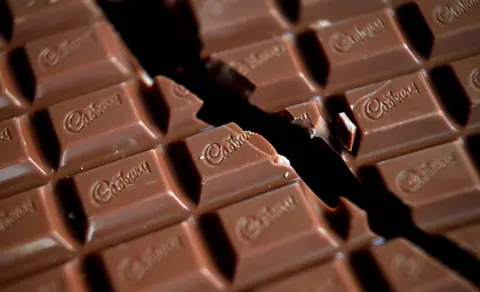 Getty Images
Getty ImagesMondelez's spokesperson said putting up prices was a "last resort" but ingredients are costing more - in particular cocoa and dairy.
"This means our products continue to be much more expensive to make.
"As a result of this difficult environment, we have had to make the decision to slightly reduce the weight and increase the list price of some of our Cadbury products," they said.
Mars Wrigley told the BBC higher cocoa prices and manufacturing costs meant they had to "adjust some… product sizes... without compromising on quality or taste."
So what has caused the price of cocoa and milk to shoot up?
Extreme weather caused by climate change has hit cocoa farmers' crop yields in Africa, says Ghadafi Razak, an academic at Warwick Business School.
Extreme rainfall in India, Brazil and Thailand in 2023, followed by droughts the following year have meant poor harvests in those countries too, pushing up prices.
The extra costs take time to feed through to customers, says Christian Jaccarini, a senior food analyst at the Energy & Climate Intelligence Unit think tank, which means those extra costs are hitting shop shelves now.
"It takes about 18 months for the impact of a shock to be felt by consumers, so we still have quite a long time with higher prices for chocolate," he said.
Milk prices have shot up too. Diarmaid Mac Colgáin, founder of the Concept Dairy consultancy blames the rising cost of feed, fuel and fertilisers as well as farmers facing higher wage bills and production costs.
He says some brands have substituted palm oil and shea oil for some of the milk to make up the fat content of their chocolate.
Shoppers are becoming increasingly aware of these cost-saving tactics, but that does not mean they are happy about it.
It is the element of unwanted surprise that can leave a bad taste, according to Reena Sewraz, retail editor at consumer champion, Which?
It can feel "especially sneaky" when companies shrink products or downgrade their ingredients she said.
"With Christmas not far away, shoppers will be looking to get the best value from what they buy," she said. "Supermarkets and manufacturers should be more upfront about making these changes. Customers may not love the news - but [then] at least they don't feel misled."

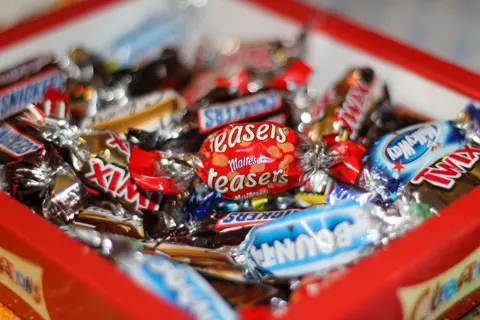 Alamy
AlamyBut there is not much you can do about it. For Becca, who insists she's not "chocolated out" despite her chocolate-tasting marathon, quality not quantity is the way to go.
She suggests fellow chocoholics treat themselves to smaller premium bars such as Tony's Chocolonely. They'll cost more but she finds them more satisfying.
She also plans to treat herself to a selection-box on Christmas day.
Otherwise she generally advises against "food snobbery".
"I think supermarket own-brands are actually a much better way to get better quality chocolate."

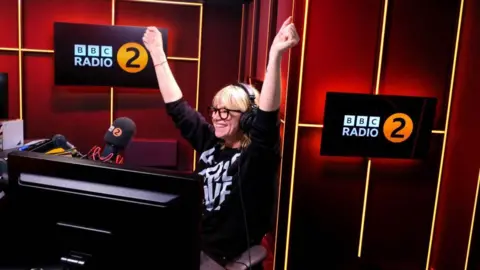 BBC
BBCZoe Ball is stepping down from presenting her BBC Radio 2 Saturday show.
Announcing her departure on air, she said she would be replaced by broadcaster Emma Willis who she described as a "superwoman".
"I love you all to bits, but I'm not disappearing completely," she told listeners.
Ball's final show is set for 20 December, although she will continue to host specials on the station. She left her Radio 2 breakfast show last December after almost six years in the role, before returning to present the 13:00 to 15:00 GMT Saturday programme.
Speaking on the show on Saturday, Ball, 55, said: "I have loved being betwixt my dear friends Romesh (Ranganathan) and Rylan (Clark), and you know, I love you all to bits, but I'm not disappearing completely.
"Obviously, it'll be Christmas Crooners and I'm doing an eras show in the new year, more on that later."
Ball said she was "thrilled" to announce that Willis would take over the Saturday afternoon slot, "a superwoman who is no stranger to you all".
She added that the new host - known for shows including The Voice, Big Brother and Love Is Blind - "will officially become a member of the Radio 2 family".
In a statement, Willis, 49, said "I'm absolutely chuffed to be joining the family - and it's a real honour to follow in the huge footsteps Zoe leaves behind, who's someone I admire and adore."
She said that she would miss listening to Ball but will "happily be the filling to a Romesh and Rylan sandwich".
Willis hosted a show on Heart Radio from 2012 to 2018 and has presented on Radio 2 as a cover presenter since 2019.

有欧洲议会资深议员13日表示,欧盟执委会将会取消原定2035年起,禁止销售燃油新车的计划。此举对德国来说,无疑是一大胜利。
路透社报导:欧洲议会最大党团“欧洲人民党”(EPP)主席韦柏(Manfred Weber)稍早发表声明透露,欧盟可能改用替代方案,要求汽车制造商自2035年起减少二氧化碳排放量90%,而不是全面禁止使用燃油引擎。
这项计划中将要实施的禁令一直是欧盟推动脱碳与加速电动车发展的核心政策之一。然而,欧盟领导层近来面临强大游说压力,特别是德国及其汽车产业为首,强调在面对来自中国的激烈竞争下,欧洲车厂所承受的沉重压力。
欧洲议会最大党团“欧洲人民党”(EPP)主席韦柏在海德堡的记者会上表示:下周二(16日),欧盟执委会将提出一项明确提案,废除对使用燃油引擎的禁令。他还主张,应交由市场与消费者决定如何达成气候目标。
中央社分析认为:韦柏的说法呼应德国奔驰(Mercedes-Benz)与BMW的立场,但与瑞典沃尔沃汽车(Volvo Cars)等已大举投资转型电动化的车厂意见相左。后者认为,欧盟政策如果急转弯,将形同背叛。
沃尔沃汽车商务长塞佛森(Erik Severinson)告诉路透社,欧盟政策如果转向,将削弱产业对未来监管法规的信心。
欧盟执委会预计16日就相关计划进行说明,但表示在正式公布前,不会对任何提案置评。
德国政府近来积极游说推翻禁令,担忧在亚洲竞争对手加速进军欧洲和美国进口关税重创之下,德国国内车厂将承受更大压力。
德国总理梅尔茨(Friedrich Merz)上月致函欧盟执委会主席范德赖恩(Ursula von der Leyen),指出电动车需求未达产业预期,车厂需要更大的政策弹性。
他写道:“欧洲汽车产业的很大一部分,包括德国在内,特别是供应链产业,正处于极为困难的经济情况,因此我们必须尽快修正欧洲的制度框架,确保这个产业在欧洲仍有未来。”

© Niki Chan Wylie for The New York Times

© Getty Images

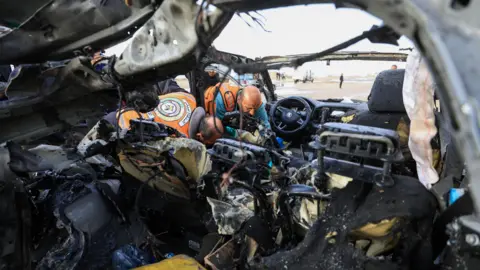 Reuters
ReutersIsrael said it killed a senior Hamas commander on Saturday in a strike on a vehicle inside Gaza.
In a statement, the Israeli military said it had "struck a key Hamas terrorist" in Gaza City.
The Hamas-run Civil Defence spokesman, Mahmoud Basal, told the BBC that four people were killed in the strike. He said multiple passers-by were also injured by the blast.
Local sources said the strike may have targeted Raed Saad, a senior commander in Hamas's armed wing, the Qassam Brigades.
The BBC is prevented by Israel from reporting independently from inside Gaza and is unable to verify details of the incident.
Saad is believed to be a member of the newly formed five-member leadership military council established since a ceasefire took hold in October.
He is regarded as one of the most prominent Qassam commanders and led several brigades during Hamas's 7 October attacks on Israeli communities east of Gaza City.
Israel has attempted to kill him on multiple occasions.
One of the most notable attempts was during a surprise Israeli operation in Gaza City in March 2024, when Israeli forces reportedly sought to arrest or kill him. Sources at the time said Saad had been inside the targeted complex but managed to escape moments before the raid.
He has long been considered one of Israel's most wanted Hamas figures, with Israeli attempts to kill him spanning more than two decades.
Saturday's attack happened on the Palestinian-controlled side of the so-called Yellow Line which has divided Gaza since an unstable US-led ceasefire came into effect on 10 October.
Israeli forces control the area to the east of the line, which includes just over half of the Gaza Strip.
The first phase of US president Donald Trump's 20-point plan for peace in the region required the return of all 20 living and 28 dead hostages taken in the Hamas-led attack on southern Israel on 7 October 2023.
About 1,200 people were killed in the attack and more than 250 people were taken hostage.
All have been returned except for the remains of an Israeli police officer, Ran Gvili, 24, who is believed to have been killed while fighting Hamas gunmen in Kibbutz Alumim.
Since then, according to Gaza's Hamas-run health ministry more than 70,000 Palestinians have been killed by Israeli military action.
The diplomatic focus is now shifting to the next stage of President Trump's plan which would require the disarmament of Hamas as part of what it calls the de-radicalisation and redevelopment of Gaza.
It envisages Gaza being run by the "temporary transitional governance of a technocratic, apolitical Palestinian committee," overseen by a "Board of Peace" chaired by Trump.
Security would be provided by an International Stabilisation Force although its make up remains unclear.
The eventual aim is for a reformed Palestinian Authority to take control of the territory, and for Israeli forces to withdraw, after which "the conditions may finally be in place for a credible pathway to Palestinian self-determination and statehood".
Many aspects of the plan are controversial in Israel where prime minister Benjamin Netanyahu has repeatedly rejected calls for the establishment of a Palestinian state.
Trump is due to meet Netanyahu to discuss the plan in the US on 29 December.

 BBC
BBCTwo US soldiers and a US civilian interpreter have been been killed in Syria in an ambush by a lone Islamic State gunman, the US military has said.
The Pentagon said three other service members were injured in the attack, during which the gunman was "engaged and killed".
The identities of those killed are being withheld for 24 hours until their next of kin have been informed.
Defence Secretary Pete Hegseth, said: "Let it be known, if you target Americans - anywhere in the world you will spend the rest of your brief, anxious life knowing the United States will hunt you, find you, and ruthlessly kill you."
This breaking news story is being updated and more details will be published shortly. Please refresh the page for the fullest version.
You can receive Breaking News on a smartphone or tablet via the BBC News App. You can also follow @BBCBreaking on X to get the latest alerts.

© Getty Images

© Saher Alghorra for The New York Times

© Don Cravens/Getty Images

 BBC
BBCPolice to take no further action over claims Andrew Mountbatten-Windsor asked officer for information on accuser Virginia Giuffre
This breaking news story is being updated and more details will be published shortly. Please refresh the page for the fullest version.
You can receive Breaking News on a smartphone or tablet via the BBC News App. You can also follow @BBCBreaking on X to get the latest alerts.

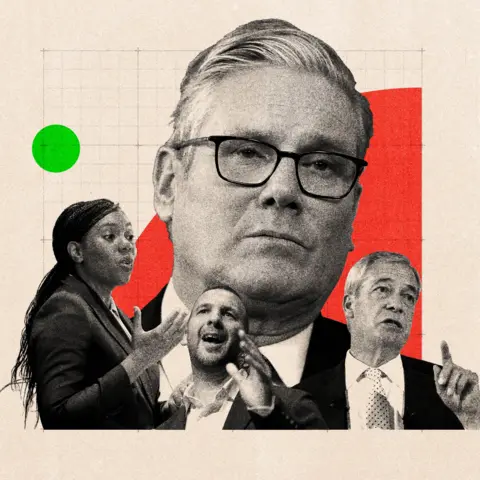 BBC
BBCGoodbye 2025 - almost. It's not worth saying, "Goodness me, the news is crazy".
"Normal" retired many years ago. But which events of this wild year actually changed us, and our politics? And what might 2026 usher in?
As the UK hurtles towards the holidays, I've been asking contacts from across the political spectrum for the moments that boggled their minds this year, and those daring, perhaps foolish, but fascinating predictions of what might come next.
2025 was chock-a-block with events scriptwriters would have found hard to come up with.
There was the Oval Office showdown when US President Donald Trump seemed deliberately to shame the leader of Ukraine, described by one MP as the "maddest moment".

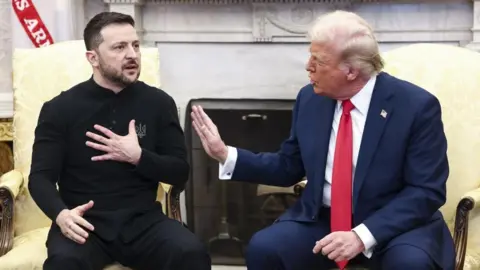 EPA-EFE/REX/Shutterstock
EPA-EFE/REX/ShutterstockAt home: a Labour cabinet minister, Steve Reed, being feted with chants of "build, baby build" and a mini swarm of activists sporting red MAGA-style hats as if, for a moment, Labour's Merseyside conference was like a Make America Great Again rally. You wouldn't have bet on such a surreal scene this time last year.
Chancellor Rachel Reeves crying on camera in the Commons chamber counts too - not just because of the human drama, but because, as one source suggests: "Global investors changed their behaviour as a result."
Yes, the second most senior politician in the land was in tears in public in the bear pit of Prime Minister's Questions.
Yes, the financial markets seemed to react, and secured her job.
The whole Budget set of decisions being published in error by the official number crunchers, the Office for Budget Responsibility, before the chancellor stood up to deliver… the budget, takes some beating as a plot twist.
And a new force on the left emerging under the Corbynista banner, but falling into disagreements with each other in spectacular style - perhaps sadly, for many on the left, that might have been easier to predict.
Don't forget, No 10 advertising its own vulnerability by proclaiming that prime minister Sir Keir Starmer would see off any challengers seeking to oust him – before any of the would-be challengers were remotely ready to come out of the shadows. Nigel Farage's insurgent party, Reform, claiming to have more members than the Tories and Labour.
Those crazy bits aside, time and again, insiders point to three factors of 2025 that have really changed where things are at.
Whether you love, loathe or shrug at the idea of Reform UK prospering, the rise of Farage's party - ahead in the polls for many months - has changed much in the last 12 months.
One former minister says, without question, the most important phenomenon in 2025 is the "rise of Reform and the death of the Tories".
Reform's success in the elections in May gave them power over billions of pounds in local government for the first time. And it put the frighteners on the traditional parties, pushing their policy agendas on immigration in particular.

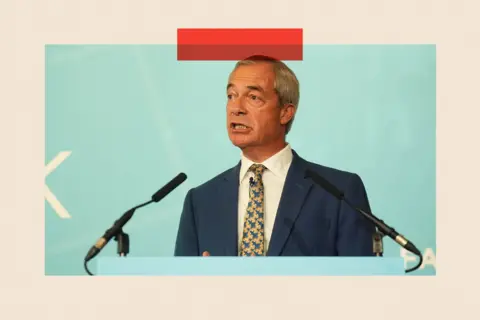 Getty Images
Getty ImagesLabour now walks and talks as if Reform is their main opposition, not the Conservatives, even though their leader Kemi Badenoch's performance has improved in the last few months.
With Reform's polling success comes increased attention, and more scrutiny.
How they handle that, not least allegations of racism, is a question for 2026, but the standard symmetry of politics of Labour v Tories is firmly out of fashion, for now.
Second, multiple sources cite a specific moment. Cast your mind back to the government's ambition to change the creaking system that leaves too many people on benefits without support to find work or improve their prospects. They also wanted to save cash for the taxpayer.
Labour backbenchers were so angry about the implications that after months of campaigning, ministers at almost the very last minute ditched that plan.
The government couldn't be sure it would win the votes, so it gave up, even though ministers say they haven't given up on making changes.
But for a government with a majority you can see from space it was an extraordinary state of affairs, the moment when Sir Keir's authority began truly to drain away.
One Whitehall insider agreed it was the biggest moment of the year, because "almost everything else has flowed from it - from then, the government was not in control of its political destiny with its own party since, and we wouldn't have had the budget we did without it".
For the country's balance sheet, the hoped-for savings disappeared, and with this, critics would suggest, any Labour ambition of saving cash from big changes to policy at home.

 PA Media
PA MediaThat decision set the backdrop for the late autumn budget which had a traditional Labour clarity, but asked firms and families to pay more tax.
One opposition source said the government has showed this year that benefits are "out of control", adding: "The decision to increase this at the cost of working people will have a consequence at the polls."
Even in the Labour Party the upshot is both welcomed and worried about.
One source called the budget "the most significant as they have dumped austerity at all costs and moved away from welfare cuts".
Another told me the whole affair is why Sir Keir, despite his huge majority, ends this political year with no guarantee he'll keep his job in the next.
If 2024 showed Labour could win but would have a hard time adjusting to power, 2025 has raised questions about the extent to which they were really capable of governing well at all.
Whatever has happened at home, 2025 has also been another year of hefty international political moves.
Trump moved back into the White House and really seems to have meant all of the things he told the world he believed in while campaigning.
Sir Keir, while regularly under attack at home, seems to have impressed the American president and some of his home audience. His moment in the Oval Office, proffering the invite from the King for a historic second state visit, "the most heart in mouth" moment of the whole year for some of his allies.
Brokering the most sensitive and the most important diplomatic relationship you have, live on global TV, can't have been the most tempting prospect for a non-showy politician like Sir Keir, who nonetheless, made a success of that moment.
Many insiders suggest the most dramatic and the most important factor of 2025 has been the behaviour of Trump 2.0.
Trump's increasingly insistent demands that Europe pays much more to cover its own defence rather than rely on America have shaped politics everywhere.
His moves to create a ceasefire after the conflict between Gaza and Israel changed the course of the Middle East.
And that's before we even start to consider his flirtation with the notion of creating an all-out global trade war, which hasn't quite come to pass.
2025 saw the UK political establishment get used to feeling constantly nervous about what Trump might do next, the perpetual guessing game of whether he really meant what he said, and what the consequences might be.
As we prepare to say goodbye to 2025, Reform's rise, Labour's woes and Trump's presence have changed our politics. So what will the next twelve months bring?
Predictions are by their very nature a guess.
2025's splintered politics, the current prospering of smaller political parties, the advance of Zack Polanski's Greens, for example, may not last.
The economic fug that has lasted for years might lift, slower inflation and interest rates cuts could shift that stubborn sense that the UK's economic fortunes are characterised by decline.
No 10 hopes its efforts to feed more kids before school by expanding breakfast clubs, cut back NHS waiting lists, provide more childcare and sort out the creaking asylum system could see not just the statistics turn their way but demonstrate that its choices might lead to better experiences for the public and, in time, some political reward - or at least an end to blame and shame.
Breath is already being held ahead of mega-May - a huge set of elections where some predict with confidence Reform will "trounce the others", a former minister says.

 Getty Images
Getty ImagesAn ally of Farage says the "sense of disbelief and disappointment is even greater than it was 12 months ago", predicting huge success in England, and in the Welsh and Scottish elections in May too.
But an experienced Conservative source reckons the most important vector of next year is that Reform will "under-perform against expectations".
Plaid Cymru stopped Reform in its tracks at the Caerphilly by-election in 2025. Farage's rivals reckon voters on the left could come together in the same kind of ways in future.
Perhaps that's more hope than expectation, but it's not impossible that 2025's froth around Reform will subside.
The anxious wait until May's elections is linked to a very common prediction that would have been almost unimaginable 12 months ago.
You've heard the speculation about whether the PM is the right man for the job.
Even some cabinet ministers tell me the May elections will be followed by an attempt to remove Sir Keir.
Whether you think it would be crackers for Labour to try to get rid of one of the two leaders alive who have won a general election, or whether it makes sense to pull up stumps on a prime minister every poll suggests the public doesn't like, many Labour MPs are convinced 2026 will be defined by a "seemingly inevitable" change at the top.
Inevitable is a word used by many. But that doesn't remotely mean it is automatic.
One Labour source says "a lot of mad stuff is going to happen because everyone is acting really stupidly".
Downing Street is making significant efforts to build up the PM's appeal to his own party. Gags abound in Labour about how many MPs have been invited to the PM's country retreat for small talk and canapes.
But in the face of deep unpopularity there is a widespread belief that a bad performance in mega-May will mean the end for Sir Keir.
There is no consensus on who should be next if the PM was challenged.
And there is no certainty a hypothetical challenger would be able to oust him if he, as was provocatively briefed, tried to fight on.
Without doubt his leadership doesn't feel permanent, and that casts a genuine shadow over so much of what the government is trying to do.
But, even when politicians say, "We can't go on like this", a less-than-tasty status quo can still be more tempting than an uncertain road.
Whatever happens at home, naturally in our interconnected world what happens elsewhere - and most notably the whims and wherefores of the American president - will have much sway over everything in 2026.
As I write, European leaders are gathering their teams, fretting, planning, hoping.
Worrying that Ukraine's future is at risk, not just because of the original aggression of Putin's invasion, but because of America's attitude – the desire to end the war seemingly stronger than the belief in Ukraine's integrity.
But for the economy, for our continent's security, and the government's relationship with its most powerful ally, one senior official predicts "the most important thing will be the terms on which a Ukrainian peace settlement comes".
The costs to Ukraine could be costs to European security, and us all.
So as we prepare to say goodbye to 2025, 2026 might be even more eventful. It's not impossible the conflict on the edge of our continent will end, although any agreement to bring it to a close might just store up future problems.
It's feasible there'll be an attempt to get rid of the prime minister, and it's not impossible Reform and the smaller parties will grab more actual power. It won't be long till we find out.
Tomorrow, in our last programme of the year, we'll be joined by Home Secretary Shabana Mahmood and the new boss of the Equality and Human Rights Commission, Dr Mary-Ann Stephenson.
Thank you to you for reading, watching and listening, and Happy Christmas!
Top image credit: Getty Images


BBC InDepth is the home on the website and app for the best analysis, with fresh perspectives that challenge assumptions and deep reporting on the biggest issues of the day. You can now sign up for notifications that will alert you whenever an InDepth story is published - click here to find out how.

 Reuters
ReutersIsrael said it killed a senior Hamas commander on Saturday in a strike on a vehicle inside Gaza.
In a statement, the Israeli military said it had "struck a key Hamas terrorist" in Gaza City.
The Hamas-run Civil Defence spokesman, Mahmoud Basal, told the BBC that four people were killed in the strike. He said multiple passers-by were also injured by the blast.
Local sources said the strike may have targeted Raed Saad, a senior commander in Hamas's armed wing, the Qassam Brigades.
The BBC is prevented by Israel from reporting independently from inside Gaza and is unable to verify details of the incident.
Saad is believed to be a member of the newly formed five-member leadership military council established since a ceasefire took hold in October.
He is regarded as one of the most prominent Qassam commanders and led several brigades during Hamas's 7 October attacks on Israeli communities east of Gaza City.
Israel has attempted to kill him on multiple occasions.
One of the most notable attempts was during a surprise Israeli operation in Gaza City in March 2024, when Israeli forces reportedly sought to arrest or kill him. Sources at the time said Saad had been inside the targeted complex but managed to escape moments before the raid.
He has long been considered one of Israel's most wanted Hamas figures, with Israeli attempts to kill him spanning more than two decades.
Saturday's attack happened on the Palestinian-controlled side of the so-called Yellow Line which has divided Gaza since an unstable US-led ceasefire came into effect on 10 October.
Israeli forces control the area to the east of the line, which includes just over half of the Gaza Strip.
The first phase of US president Donald Trump's 20-point plan for peace in the region required the return of all 20 living and 28 dead hostages taken in the Hamas-led attack on southern Israel on 7 October 2023.
About 1,200 people were killed in the attack and more than 250 people were taken hostage.
All have been returned except for the remains of an Israeli police officer, Ran Gvili, 24, who is believed to have been killed while fighting Hamas gunmen in Kibbutz Alumim.
Since then, according to Gaza's Hamas-run health ministry more than 70,000 Palestinians have been killed by Israeli military action.
The diplomatic focus is now shifting to the next stage of President Trump's plan which would require the disarmament of Hamas as part of what it calls the de-radicalisation and redevelopment of Gaza.
It envisages Gaza being run by the "temporary transitional governance of a technocratic, apolitical Palestinian committee," overseen by a "Board of Peace" chaired by Trump.
Security would be provided by an International Stabilisation Force although its make up remains unclear.
The eventual aim is for a reformed Palestinian Authority to take control of the territory, and for Israeli forces to withdraw, after which "the conditions may finally be in place for a credible pathway to Palestinian self-determination and statehood".
Many aspects of the plan are controversial in Israel where prime minister Benjamin Netanyahu has repeatedly rejected calls for the establishment of a Palestinian state.
Trump is due to meet Netanyahu to discuss the plan in the US on 29 December.

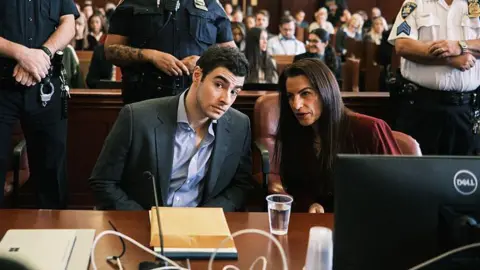 Getty Images
Getty ImagesLuigi Mangione, the man accused of fatally shooting United Healthcare CEO Brian Thompson in a case that sparked national attention, watched as new testimony and never-before-seen footage from the day of his arrest in a McDonald's was unveiled during a hearing this week.
Mr Mangione has pleaded not guilty to state charges related to the 2024 murder of Mr Thompson, a father of two, as well as federal counts that carry the possibility of the death penalty.
The pre-trial hearing is focused on the defence's attempts to keep certain evidence out of the trial, which has not been scheduled yet, including items found in his backpack during his arrest and statements he made to officers.
During the first two weeks of the hearing, supporters of Mr Mangione - the scion of a prominent Maryland family and Ivy League graduate - filled the back rows of the Manhattan criminal courtroom, some wearing a pin portraying him as a saint-like figure.
Prosecutors and Mr Mangione's legal team are expected to question over a dozen witnesses from the day of his arrest, including the employees who spotted him and the police who arrested him.
Here is a look at some of the key pieces of evidence discussed that offer a window into Mr Mangione's trial.
The pre-trial hearing has centred on the small-town McDonald's in Altoona, Pennsylvania, where officers were shocked to find the high-profile suspect days after Mr Thompson was fatally shot - and hours from the busy Midtown Manhattan crime scene.
Witnesses suggested the arrest may never have occurred there if not for one of Mr Mangione's key features: his eyebrows.
During the first day of the hearing, prosecutors played a call to police from a McDonald's employee about a tip from a customer in the restaurant.
The employee said the customer thought a patron looked like the suspect in the United Healthcare CEO shooting. The patron was well covered, wearing a black hoodie, a medical mask and a tan beanie. But one key detail stuck out.
"The only thing you can see is his eyebrows," the employee told police.
It was not the only time Mr Mangione's distinguished eyebrows have come up.
Prosecutors also entered into evidence notecards they say Mr Mangione had, which appeared to be to-do lists for the days after the high-profile shooting.
One card reads: "Keep momentum, FBI slower overnight," while another said: "Change hat, shoes, pluck eyebrows".

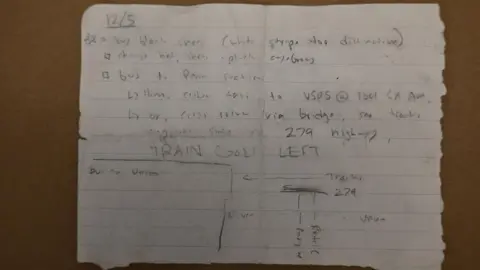 New York County District Attorney's Office
New York County District Attorney's OfficeDozens of videos released by prosecutors show Mr Mangione's encounter with police and his eventual arrest in the McDonald's as other customers watched.
Officers who responded narrated the footage this week, telling the court what was going through their minds as they realised the 27-year-old appeared similar to the suspect in photos.
On Thursday, Altoona Lieutenant William Hanelly said a fellow officer responded sarcastically that he would "get right on it" when he heard the tip about the suspect.
Mr Hanelly told the court that he understood the sarcasm, because it seemed "preposterous" that a shooter from "New York City had found his way to a McDonald's in Altoona, Pennsylvania".
But at the scene, officers said they quickly saw the resemblance to New York Police Department pictures circulated to the public after days without any leads.
"It's him. I'm not kidding. He's real nervous. It's him," one officer can be heard telling Mr Hanelly in a phone call played for the court.
In one video, Mr Mangione eats a McDonald's meal as officers stand guard around him in the restaurant waiting for more officers to arrive.
At the hearing, Mr Mangione watched the videos quietly from the defence table, seated next to his lawyers - wife and husband Karen Friedman Agnifilo and Marc Agnifilo. The latter defended Sean "Diddy" Combs, who was acquitted of sex trafficking and racketeering charges just months earlier.
Wearing a grey suit and button-down shirt most days, Mr Mangione frequently took notes on a legal pad, and occasionally smiled and laughed with his lawyers.
In the series of police body camera videos played for the court, Mr Mangione's interactions with officers eventually lead to his arrest on 9 December as Christmas music plays loudly in the background of the McDonald's.
When officers first speak to Mr Mangione, they ask him to pull his mask down. He listens, and is heard telling officers his name is "Mark Rosario", handing them a New Jersey identification that police later said was false.
That identification gave officers enough cause to arrest Mr Mangione, Mr Hanelly told the court, and in the video, Mr Mangione tells officers his real name is Luigi.
In another body camera video, an officer tells the 27-year-old he is under police investigation for giving a fake identification and Mr Mangione is seen putting his hands on the wall as officers arrest him.
They then take a photo of Mr Mangione with his hands behind his back, an image widely circulated on social media after his arrest.
The pre-trial hearing also shed light on the items Mr Mangione was carrying when he was arrested.
Mr Mangione's lawyers have argued that a 9mm handgun as well as a notebook should be excluded from trial because officers did not have a warrant to search his backpack. Prosecutors allege that Mr Mangione wrote in his notebook about "the deadly, greed-fuelled health insurance cartel".
During the hearing on Thursday, Mr Hanelly argued that there were exceptions for warrants.
Earlier in the week, Ms Friedman Agnifilo questioned the officer who searched Mr Mangione's backpack, arguing they were searching the bag "because you thought he was the New York City shooter".
"No, we search everyone," said the officer, Christy Wasser.

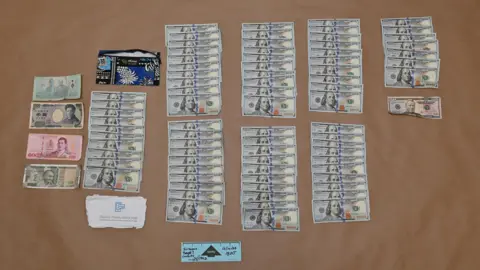 New York County District Attorney's Office
New York County District Attorney's OfficeVideo played in court shows a police officer pulling a series of items from the backpack, including a handgun magazine that Mr Hanelly said contained 9 mm bullets - all as Holly Jolly Christmas plays over the speaker.
One law enforcement official comes across a journal in the backpack, and can be heard saying it reads like a "manifesto".
Ms Agnifilo objected after the "manifesto" part of the video was played repeatedly in court, arguing the prosecutor wanted to emphasise the line.
Eventually, Mr Hanelly testified, the officers decided to stop searching the backpack and take it to the police station because "it was going to be a mess".
Prosecutors this week entered into evidence images of other items Mr Mangione had with him, including a gun, a silencer, dozens of $100 bills, face masks, a hair trimmer and a passport.
The hearing is expected to continue into next week.

© Saher Alghorra for The New York Times

© Agence France-Presse, via House Oversight Democrats/Afp Vi

© Baderkhan Ahmad/Associated Press

© Annie Rice/Associated Press

(德国之声中文网)美国众议院监督委员会的民主党成员周五(12月12日)公布了一批未注明日期的照片,显示已故性犯罪富豪爱泼斯坦(Jeffrey Epstein)与一些知名人物互动,包括美国前总统比尔·克林顿(Bill Clinton)和现任总统特朗普。这些照片仅是美国众议院监督委员会从爱泼斯坦遗产管理机构收到的逾9.5万张照片中的一小部分。
美联社介绍,本次公布的照片与司法部即将被强制披露的案件档案无关。特朗普政府下周将面临公布相关档案的最后期限。
这些照片没有配文或背景说明。美国众议院监督委员会的首席民主党议员罗伯特·加西亚(Robert Garcia)表示,不会说明这些照片中的女性是否为受害者,但他补充说:“我们从第一天起就承诺会遮盖任何可能导致对受害者造成伤害的照片或信息。”
民主党人承诺在接下来的几天或几周内将持续公布照片,以向特朗普施压,追究其政府早前在爱泼斯坦调查中拒绝公开文件的责任。
加西亚补充道:“特朗普现在必须将这些档案向美国公众公开,这样真相才能揭晓,我们才能为幸存者争取一点正义。”

特朗普:没什么大不了
特朗普在周五晚些时候表示他之前从未见过这些照片,并在椭圆形办公室对记者说:“大家都认识这个人。他经常出没于棕榈滩,和所有人都有合照。”
特朗普还淡化了这些照片的重要性,他指出:“有成百上千人和他合过影。所以这没什么大不了的。我对此一无所知。”
涉及多名权贵名流
美国众议院监督委员会的民主党成员在周五早上最初公布了19张照片,之后又公布了约70张照片,均由爱泼斯坦的遗产管理机构提供。除了特朗普和克林顿以外,还涉及前特朗普顾问史蒂夫·班农(Steve Bannon)、美国前财政部长拉里·萨默斯(Larry Summers)、电影导演伍迪·艾伦(Woody Allen)、前英国王子安德鲁·蒙巴顿-温莎(Andrew Mountbatten-Windsor)、微软创始人比尔·盖茨(Bill Gates)和维珍集团的理查德·布兰森(Richard Branson)。
这些照片还展示了性玩具,甚至还有一种印有特朗普卡通头像和“我很大!”字样的“特朗普避孕套”。

白宫谴责“选择性发布”照片
有关特朗普的多张照片中有一张显示,特朗普与六名女性合影,女性的面部已被遮挡。这些女性脖子上佩戴着类似传统夏威夷花环的饰品。
另一张照片中,特朗普正在与一位金发女子交谈,背景中可见爱泼斯坦。
白宫发言人阿比盖尔·杰克逊(Abigail Jackson)指责民主党“有选择性地发布经过随意遮挡的照片,试图制造虚假叙述”,她强调:“针对特朗普总统的民主党骗局已经被多次揭穿。”
DW中文有Instagram!欢迎搜寻dw.chinese,看更多深入浅出的图文与影音报道。
© 2025年德国之声版权声明:本文所有内容受到著作权法保护,如无德国之声特别授权,不得擅自使用。任何不当行为都将导致追偿,并受到刑事追究。
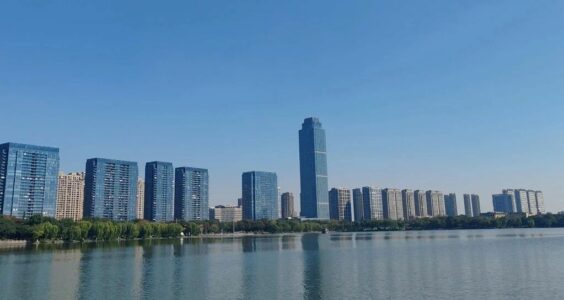
作者:H活力健康家 | 公众号:H活力健康馆
现在国内大环境不好,需求萎靡不振,很多企业面临订单不足,降薪裁员,一些外资企业也纷纷跑路。
这些资本主义国家的企业,被称为是一种以生产资料私有制为核心基础、以资本增值为根本目标,资本家都是逐利的等等。
但这些所谓的资本家-外资企业撤资后对员工的补偿方案,让我们看到了“资本主义”的真面目。他们把法律基准作为最低标准,而对于国内很多企业来说,这个基准是高不可攀的最高标准。
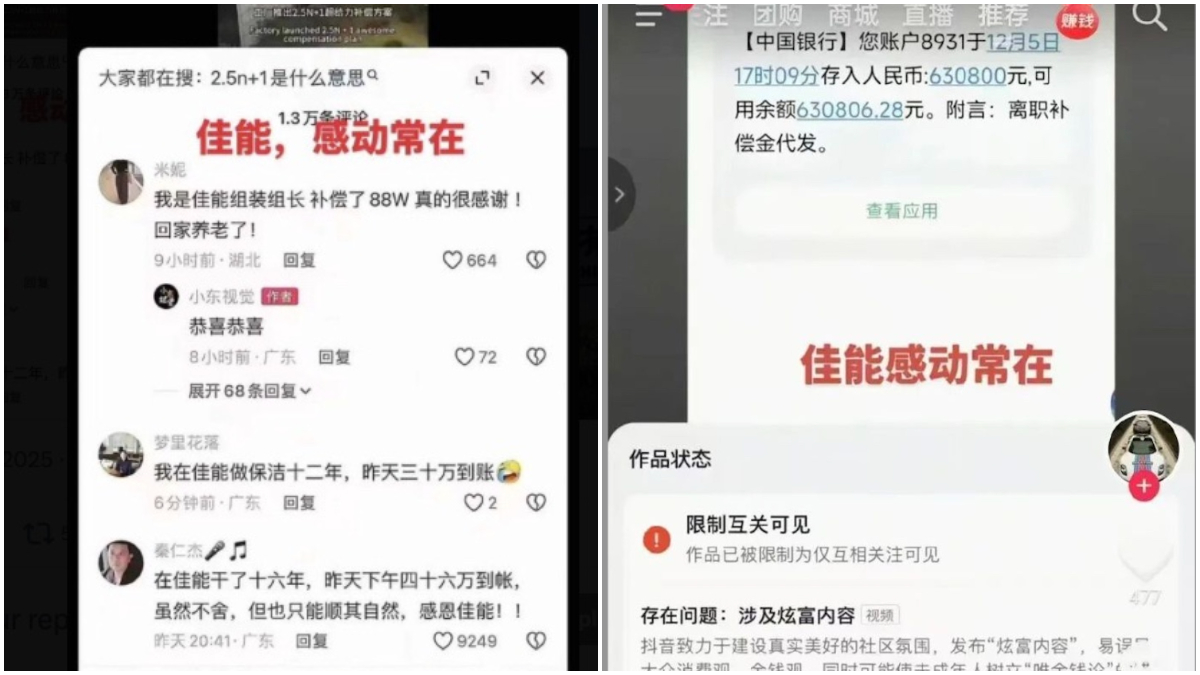
法定最低标准:
N+1
《劳动合同法》第 47 条规定,每满 1 年支付 1 个月工资 (N),未提前 30 天通知额外 1 个月 (+1);
2N
企业违法解除劳动合同,按经济补偿标准 2 倍支付,适用于无正当理由或程序违法的裁员;
注:月工资指离职前 12 个月平均工资 (含奖金津贴),上限为当地社平工资 3 倍,年限最高 12 年;
1、FreeWheel (美国广告技术)
方案
2N+2 个月奖金 + 年假折算 (约 2N+8),6 个月带薪过渡期;
背景
因数据法案影响关闭北京办公室,员工获 "史上最高赔偿",含 6 个月工资照拿的过渡期;
2、奔驰中国
方案
N+9,未入职额外 3-4 月工资 (最高 N+11);
案例
30 年工龄主管月薪 9000 欧元,获赔约 413 万元人民币;
3、佳能中山(2025 年 11 月)
方案
2.5N+1(核心)+5 个月就业支援金 + 1 万元贡献奖 + 5000 元奋斗奖,无工资上限和 12 年工龄限制;
案例
18 年工龄员工获赔约 40 万元 (相当于 3 年年薪);
背景
打印机市场萎缩,国产替代崛起,24 年老厂关闭;
4、花旗银行(2025 年中)
方案
N+6 (签约时间不同有差异:6.26-7.16 签约 N+3,7.17-9.19 签约 N+1);
规模
上海、大连约 3500 名技术人员被裁;
5、PayPal(2025 年初)
方案
N+6,员工称 "补偿金丰厚,丧事喜办";
6、SAS 研究所(2025 年 11 月)
方案
N+2 + 年终奖 + 截至 2025 年底工资,签约期限内签署获 N+2,否则 N+1;
背景
在华运营 25 年后完全撤出,400 名员工全员被裁,赔偿中位数超 45 万;
7、IBM 中国投资(2025 年 3 月)
方案
9.13 前签约 N+3,9.20 前签约 N+1;
规模
约 1800 名员工受影响,部分员工争取 2N 赔偿和股票折现;
8、沃尔沃上海
方案
N+3.5 (含 0.5 年假补偿),社保缴至月底;
9、微创医疗(2025 年 11 月)
方案
N+1 + 签字额外 2000 元 + 年假折现 (1:1);
规模
全国约 2000 名员工,波及上海、无锡两地;
10、无锡柯尼卡美能达
方案
N+1,工龄 10 年以上额外补偿;
行业
典型方案
代表企业
特点
汽车
N+6~N+11
奔驰、大众
高端品牌补偿高,多有 "再就业保障期"
电子制造
2.5N+X~N+5
佳能、爱普生
日企普遍高于法定标准,重视员工关系
软件 / 互联网
2N+X~N+6
FreeWheel、IBM
技术企业补偿灵活,含股票、期权等
金融
N+3~N+6
花旗、PayPal
外资银行补偿稳定,多与业绩挂钩
医疗器械
N+1~N+2
微创医疗
补偿相对保守,注重合规性

作者:夫子张 | 公众号:夫子张
这事很魔幻,但是也很现实。
说来也怪,大家总是一窝蜂的去买房、考公、考编、抢药、抢盐,就生怕晚了半拍。
作为考公大省出来的打工人,夫子当初坚决不考公的决定让四邻八乡直摇头,大家直言这个孩子完了。
在他们眼里,只要没编制,只要吃不上“黄粱”,夫子这种可悲的人生就是彻头彻尾的失败。
外界根本就想象不到俺们大沙东考编、考公究竟有多疯狂。
有数据显示,2025年山东高校有超过60%的应届生有参与考公考编的意向,2025年的国考,济南有1个税务岗,649人来竞争。
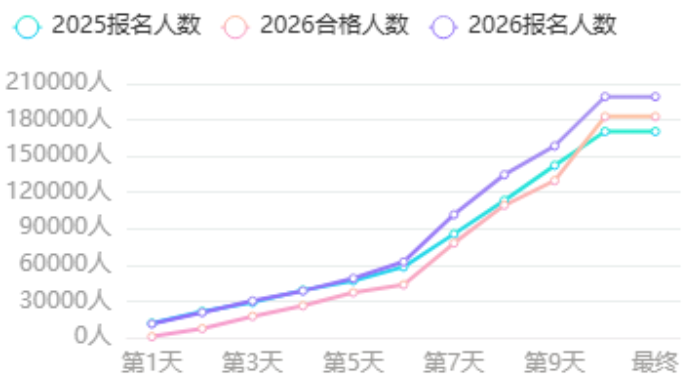
近三年,沙东考公报名人数也是年年递增。
2026年国考,沙东182751人通过审查,全省平均竞争比83.4:1,职位最大竞争比是2963:1。
很多人对这个最大竞争比没啥概念。
2963:1相当于全省230名以内,高考录取率约0.034%,清北在沙东的录取率也就是0.05%,也就是说考到全省前340名左右就行。
哪怕沙东,这也是远超985、211的难度,同时比考清北的难度还要高。
高考好歹是大家都有学上,考公是“一个萝卜一个坑”,大家争夺唯一席位,更残酷。
想想也是很刺激,2026年的考公人数以372w实现了对考研人数343w的绝地反超。
夫子认识的那些朋友,当初拼了命的考985、211,现在又拼了命的考公考编往家跑。
济南有一条著名的考公一条街,人家搞辅导的广告词都是“一举成公”,说实话,真的魔障了。
夫子看不懂,但确实大受震撼。
以前小日子也有过这样一段潇洒的时光,经济泡沫破裂后,公务员在日本被称为神的职业。
90年代,65w+的日本年轻人,为了端上铁饭碗,争先恐后打破了头。
到了2023年,日本地方公务员的报名人数只剩4.7w,报考比不足1:3,年轻人唯恐避之不及。
很多人说,嗐,小日子怎么能跟咱比?大家当初拼命买房上杠杆的时候,也是这么说滴。
现在不管应届生,还是往届生,在考公一条街,交着天价的学费,每天模拟、疯狂训练,目标就是上岸。
明年毕业生接近1300w,就照这个节奏,考公人数超过毕业生数应该不远了。
国考一完事儿,接着各省轮考就来了,不过四川、上海、浙江、山东、天津、江苏、北京的时间线基本重叠。
下面只是预估,具体要看各省市官方通知。
现在很多大学生,为了考公,大二、大三就开始准备。
不过很多家长倒是把这事儿看明白了,既然考大学的目的都逃不过考公、考编,那就从大一开始规划起来。
考公已经不是“退路”,现在成了各行各业打工人的最佳出口。
不过这些享受各种教育资源的年轻人,目标就是考公、考编上岸,这事儿想想就荒诞。
大家都在就业的苦海里挣扎,都想拼命上岸,因为觉得上岸就是避风港。
不过时代的潮汐之下有着每个人的命运投影,海浪越汹涌,大家越想爬上编制的礁石,当礁石上都挤满了沉默的守望者,未来的时代,会定义这场集体上岸,以及这一代人的航程。